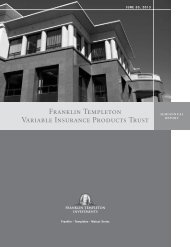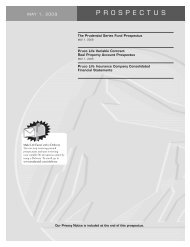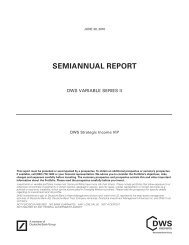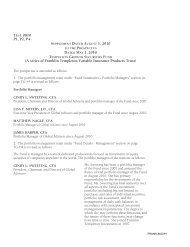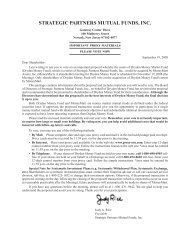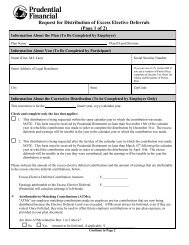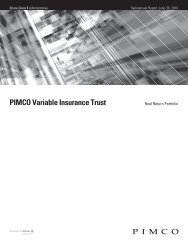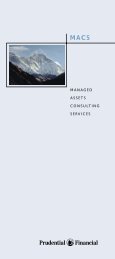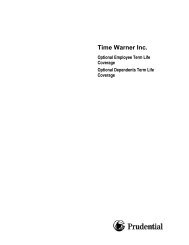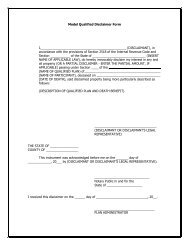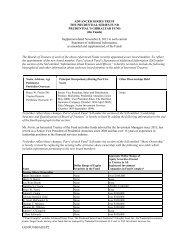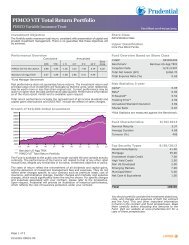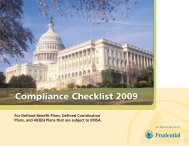Anti-Money Laundering and Office of Foreign Assets ... - Prudential
Anti-Money Laundering and Office of Foreign Assets ... - Prudential
Anti-Money Laundering and Office of Foreign Assets ... - Prudential
You also want an ePaper? Increase the reach of your titles
YUMPU automatically turns print PDFs into web optimized ePapers that Google loves.
<strong>Prudential</strong> Policies for Vendors<br />
Policy:<br />
<strong>Anti</strong>-<strong>Money</strong> <strong>Laundering</strong> <strong>and</strong> <strong>Office</strong> <strong>of</strong> <strong>Foreign</strong> <strong>Assets</strong> Control<br />
Description: <strong>Prudential</strong> will not knowingly engage in financial transactions that involve<br />
proceeds from unlawful activity or that support terrorist activities (commonly<br />
referred to as “money laundering” or “terrorist financing” respectively, <strong>and</strong><br />
described below in the Additional Information section).<br />
Additionally, <strong>Prudential</strong> <strong>and</strong> its associates will not engage in financial<br />
transactions with individuals, entities <strong>and</strong> restricted countries designated by The<br />
U.S. Department <strong>of</strong> the Treasury <strong>Office</strong> <strong>of</strong> <strong>Foreign</strong> <strong>Assets</strong> Control (OFAC) or<br />
similar sanctions regulations in other countries where the Company does business.<br />
For more information on OFAC, see the Additional Information section below.<br />
<strong>Prudential</strong> will file government reports, including those concerning suspicious<br />
activities, as required by applicable law.<br />
In particular, the following activities are prohibited globally:<br />
Knowingly engaging or attempting to engage in any transaction involving<br />
proceeds derived from unlawful activity;<br />
Knowingly engaging or attempting to engage in any transaction that supports<br />
terrorist activity;<br />
Knowingly engaging or attempting to engage in any transaction in violation <strong>of</strong><br />
OFAC restrictions or similar regulations in non-U.S. countries;<br />
Accepting cash from a customer to purchase a cashier’s check (or similar<br />
instrument) for that customer except to the extent that this practice is<br />
customary <strong>and</strong> permitted in countries outside the United States;<br />
Advising customers on how to avoid anti-money laundering reporting<br />
requirements;<br />
Arranging with a financial institution for a customer to exchange cash for a<br />
different form <strong>of</strong> payment (in certain countries special currency exchange<br />
programs may be exceptions to this rule – see the Additional Information<br />
section);<br />
Transporting physically any cash or monetary instruments into, or out <strong>of</strong>, the<br />
United States or another country for customers; <strong>and</strong><br />
Disclosing to customers that they are the subjects <strong>of</strong> a regulatory report or<br />
under investigation, except to the extent that this prohibition is contrary to<br />
local country law.<br />
You play an important role in detecting <strong>and</strong> preventing money laundering activity<br />
as part <strong>of</strong> your <strong>Prudential</strong> engagement. If you suspect that a <strong>Prudential</strong> employee,<br />
customer, potential customer or financial transaction may involve suspicious<br />
activity, money laundering or terrorist financing, you must notify your <strong>Prudential</strong><br />
<strong>Prudential</strong> Proprietary <strong>and</strong> Confidential Rev. 12/15/2011
<strong>Prudential</strong> Policies for Vendors<br />
contact, who then must advise the <strong>Anti</strong>-<strong>Money</strong> <strong>Laundering</strong> Unit, Law or<br />
Compliance immediately.<br />
ADDITIONAL INFORMATION<br />
Descriptions <strong>of</strong> <strong>Money</strong> <strong>Laundering</strong> <strong>and</strong> Terrorist Financing<br />
In general, money laundering or terrorist financing may involve one or more <strong>of</strong><br />
the following activities:<br />
Knowingly dealing with proceeds from criminal activity;<br />
Knowingly dealing in funds to support or facilitate criminal or terrorist<br />
activities;<br />
Being involved in any activity designed to hide the nature, location, source,<br />
ownership or control <strong>of</strong> proceeds <strong>of</strong> criminal activity; <strong>and</strong>/or<br />
Advising a <strong>Prudential</strong> employee or customer on how to structure a transaction<br />
to avoid reporting <strong>and</strong> record keeping requirements.<br />
Additional Prohibited Conduct<br />
In addition, prohibited conduct would include the knowing failure to act, such as<br />
failing to report money-laundering activities to <strong>Prudential</strong>, not following<br />
appropriate detection procedures, or knowingly ignoring indications <strong>of</strong> criminal<br />
conduct.<br />
What is OFAC?<br />
The U.S. Department <strong>of</strong> the Treasury <strong>Office</strong> <strong>of</strong> <strong>Foreign</strong> <strong>Assets</strong> Control (OFAC)<br />
administers <strong>and</strong> enforces economic <strong>and</strong> trade sanctions based on U.S. foreign<br />
policy <strong>and</strong> national security goals against targeted countries, terrorists,<br />
international narcotics traffickers, <strong>and</strong> those engaged in activities related to the<br />
proliferation <strong>of</strong> weapons <strong>of</strong> mass destruction. OFAC acts under U.S. Presidential<br />
wartime <strong>and</strong> national emergency powers, as well as authority granted by specific<br />
legislation, to impose controls on transactions <strong>and</strong> freeze non-U.S. assets under<br />
U.S. jurisdiction. Many <strong>of</strong> the sanctions are based on United Nations <strong>and</strong> other<br />
international m<strong>and</strong>ates, are multilateral in scope, <strong>and</strong> involve close cooperation<br />
with allied governments. OFAC regulations require financial institutions to take<br />
certain actions to prevent prohibited transactions <strong>and</strong> to address potentially<br />
prohibited transactions when identified.<br />
<strong>Prudential</strong> Proprietary <strong>and</strong> Confidential Rev. 12/15/2011



